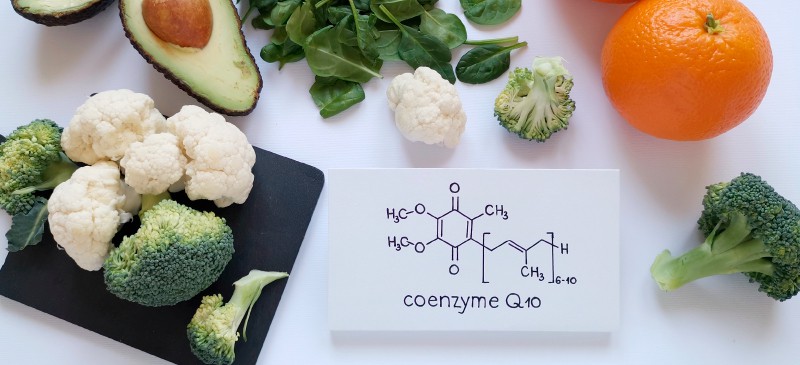

Image from draxe.com
Coenzyme Q10 (CoQ10) is a substance that helps convert food into energy. CoQ10 is found in almost every cell in the body, and it is a powerful antioxidant. CoQ10, also known as ubiquinone, is a lipid-soluble quinone compound intricately embedded in the mitochondria of eukaryotic cells. Its indispensable role in mitochondrial bioenergetics makes CoQ10 a critical component in the electron transport chain (ETC), where it facilitates electron transfer, ultimately contributing to adenosine triphosphate (ATP) synthesis which our cells use for energy. In this technical discourse, we delve into the molecular intricacies of CoQ10, its biosynthesis, functional significance, and its potential applications in health and disease.
Molecular Structure and Biosynthesis:
CoQ10 has a structural motif allowing for its lipophilicity and integration into the hydrophobic environment of the inner mitochondrial membrane. Its synthesis involves a series of enzymatic reactions, predominantly occurring in the mitochondria. The coordinated action of multiple enzymes, including Coq1-9 proteins, orchestrates this intricate process.
Mitochondrial Bioenergetics and CoQ10:
The central role of CoQ10 lies in its participation in the ETC, a complex series of redox reactions occurring in the inner mitochondrial membrane. CoQ10 shuttles electrons, facilitating the pumping of protons across the inner mitochondrial membrane. This establishes an electrochemical gradient that powers ATP synthesis via Complex V (ATP synthase). CoQ10’s involvement in this process renders it indispensable for cellular energy production.
Clinical Implications and Health Benefits:
- Cardiovascular Function: CoQ10’s significance in myocardial bioenergetics underscores its potential therapeutic applications in cardiovascular diseases. Studies have explored its efficacy in conditions such as heart failure, demonstrating improved myocardial contractility and overall cardiac function.
- Antioxidant Defense: Beyond its role in energy production, CoQ10 serves as a potent antioxidant, mitigating oxidative stress-induced cellular damage. This characteristic positions CoQ10 as a potential therapeutic agent in conditions characterized by heightened oxidative stress.
- Neurological Health: Emerging research suggests a potential role for CoQ10 in neuroprotection, particularly in neurodegenerative disorders. Its antioxidant properties and mitochondrial support may confer neuroprotective effects, warranting further investigation.
Considerations and Future Prospects:
While CoQ10 exhibits promising therapeutic potential, caution must be exercised in its application. Potential interactions with certain medications and variability in individual responses necessitate careful consideration. Moreover, ongoing research aims to elucidate CoQ10’s role in cellular signaling pathways, gene expression regulation, and its potential in targeted drug delivery systems.
Conclusion:
Coenzyme Q10, with its intricate molecular structure and pivotal role in mitochondrial bioenergetics, emerges as a fascinating subject of study. The interplay between CoQ10 and cellular processes extends beyond energy production, opening avenues for therapeutic interventions in various pathological conditions. As our understanding deepens, Coenzyme Q10 stands poised at the intersection of cellular biology and clinical applications, holding the promise of novel insights and therapeutic avenues for the future.



